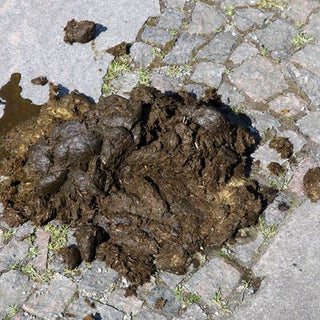Feeding Horses with Free Fecal Water Syndrome
Free Fecal Water Syndrome (FFWS) is a distressing condition in which horses produce normal fecal balls alongside an excess of free water, leading to watery feces that can cause discomfort and a messy hind region. This excess free water runs down the horse's hind legs, attracting flies to the horse and potentially causing skin irritation. It's a condition found that horses of all types can suffer from, but research has indicated it occurs more frequently in horses that have experienced changes in diet or management, or those with a disrupted gut health. This syndrome, known as FFW among equine healthcare professionals, is different from diarrhea as horses with FFW still maintain their ability to produce solid fecal balls. It may, however, be indicative of other underlying health issues or an imbalance in the gut bacteria. This blog aims to shed light on this often-misunderstood condition and provide guidelines for effective management of horses with FFWS
Caring for horses with FFWS, or Free Fecal Water Syndrome, is a challenging task for any horse owner. This condition, in which horses produce normal fecal balls accompanied by free water, is often seen in older horses and can lead to numerous problems. Understanding the potential causes and best treatment options can make a huge difference in the health and well-being of horses suffering from this syndrome.
Causes of Free Fecal Water Syndrome in Horses
Although FFWS is not fully understood, equine research suggests several potential causes. Some horses with FFWS show signs of an imbalance in the gut bacteria, which can affect gut health and lead to the production of free fecal water. The condition may also be due to an inability of the large intestine to effectively absorb water, causing free water to run out with normal manure. In some cases, FFWS may be a disease of older horses, due to changes in their digestive system.
Causes of Diarrhea in Horses
Diarrhea in horses can be caused by various factors, including infectious causes like colitis or non-infectious factors like poor-quality forage, rapid diet changes, or stress. In some cases, horses with and without FFWS may experience diarrhea. However, the presence of free fecal water in horses does not necessarily indicate diarrhea, as the horse may still produce solid fecal balls. It is important to work with an equine veterinary professional to diagnose diarrhea and rule out infectious causes.
Researchers have found that horses may develop diarrhea due to changes in their gut health. An inflammatory response in the horse's hindgut, specifically in the colon and other intestinal areas, can impair the absorption of water, resulting in loose, watery stools. Some affected horses may exhibit their inability to absorb water correctly, leading to a significant increase in the water content of their feces as the body tries to expel whatever is causing the inflammation. This is often due to infectious causes of diarrhea, including bacterial, viral, or parasitic infections, which can lead to substantial changes in the normal microbial population in the hindgut of horses. Regular check-ups and a keen understanding of your horse's normal behavior and fecal output can help in early diagnosis and treatment.
Diagnosing Allergies and Irritations
While we recommend working with your vet and equine nutritionist to best uncover what causes fecal water syndrome in your horse, it may be due to a simple irritation of the gut. Horses with fecal water may improve tremendously by determining if any of the horse's current foodstuffs are causing him gut irritation. Monitor the horse's diet closely and consider restricting access to feeds that may be causing him distress.
Treating Diarrhea: A Closer Look at Forage
A key strategy in managing diarrhea in horses involves the type of forage provided. Good quality forage can improve bowel regularity and stimulate strong gut contractions, which can help to absorb water and reduce the amount of free fecal liquid. Mixing it with water and fiber pellets may further aid the absorption process. An equine nutritionist can guide horse owners on the best type of forage for horses with diarrhea or FFWS.
Use of Probiotics for Horses with Diarrhea
Research suggests that the use of probiotics may help horses with diarrhea and FFWS by improving gut health and rebalancing gut bacteria. Probiotics encourage the growth of beneficial gut bacteria, which may help to solidify watery feces and reduce the symptoms of FFWS. However, the effect of probiotics can vary, and some horses may not respond to this treatment. Therefore, the use of probiotics should be discussed with a veterinary professional. We have a blog dedicated to the role probiotics and prebiotics play in a healthy horse and this may be worth checking out if you do have horses with fws, infectious diarrhea, or simply want to understand more about their impact on gut health in horses more generally.
Long-term Management of Horses with FFW Syndrome
The long-term management of horses with FFWS involves a combination of diet adjustments, routine veterinary care, and close observation of defecation patterns. Regular checks of the horse's hind end can help identify any issues, such as inflammation or flies attracted to the wet manure. Horse owners should be aware of changes in their horses’ bowel movements and consult with their vet if symptoms persist. In severe cases of FFWS, a fecal transplant may be considered to restore a healthy balance of gut bacteria.
Summary: Fecal Water Syndrome in Horses
Free Fecal Water Syndrome in horses is a condition that causes significant distress for both horses and their owners. While the exact cause remains uncertain, it's important to focus on maintaining good equine nutrition, adjusting forage intake, and exploring options like probiotics. Although managing FFWS can be challenging, with proper understanding and care, many horses with FFWS can lead comfortable lives. Always consult with your veterinary professional for the best advice regarding this condition.

